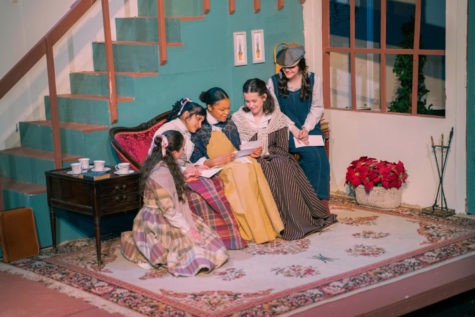For five shows the weekend of February 9, the LM Black Box theater transformed into Civil War-torn America. Over the course of an hour and a half (with a fifteen minute intermission) one could witness the coming of age of Meg, Jo, Amy, and Beth March as written in Louisa May Alcott’s Little Women and adapted for stage by Scott Davidson. A beloved classic story given new life by Greta Gerwig’s 2019 film, there are high expectations for any reproduction of the story. But with just the right balance of innovation and loyalty to the source material, LM Players wonderfully succeeded in bringing it to life.
As even with the most well known shows, much of the storytelling comes down to the creative liberty of the director. Senior Nick Barr Bono made all the right choices. One key example was the decision to split the lead Josephine March into two roles: the younger “Jo,” conducting in all the interpersonal action, and the older “narrator,” an adult Jo telling the story in her novel. In the original production, Jo March would stay behind in each scene to break the fourth wall and address the audience in her narration. But here, at Barr Bono’s discretion, the audience got to imagine Jo truly as the young version of the narrator that she was. And Barr Bono’s decision was only amplified by the casting—the Knight brothers, senior Jamie and sophomore Kiri, resemble each other so nearly in both appearance and mannerisms that the transitions were effortless and easily believable. It was a risky divergence from the source, but—thanks to strategic costuming, careful blocking, and performances by the Knights—a risk that was well-paid off.
Additionally, contributions of the rest of the actors cannot be understated. Veteran players’ talent came through as always: Anusha Vyas ’23 embodied the loveable yet temperamental and childish Amy, Abigail Parks ’23 the mature and eldest Meg, and Kendall Johnson ’23 as the adoring maternal figure Marmee. But most worth noting was the performance of acting newcomer Sarah Stanger ’23 as Beth. As a senior, Stanger had never auditioned for a Players production before. But her ability to connect with the audience and embody the much beloved Beth through her illness and passing is nothing of a novice. “Even though I was terrified,” Stanger reflected, “Players was the safest space for me to completely jump into something I had never done before and completely immerse myself into being creative and myself without reservation.” Even more commendable, Stanger learned the piano for this part. On the Saturday night performance (and, according to Barr Bono, at many others), tears could be heard across the audience as Stanger made her metaphorical departure from the stage. Audiences can only hope that she continues acting her future beyond LM.
Further successes should be attributed to the Costume Crew’s lovely period-inspired pieces and to Scenery for a dynamic and interesting structure that functioned as the March house. The show was brought together as much behind the scenes as on the stage—and overall, I believe it to be one of the most seamless performances I have ever seen in my four years at LM.







